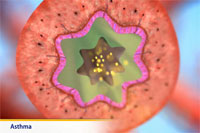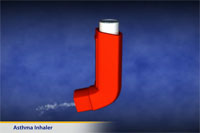
Asthma: Tobacco Smoke and Your Child
How does tobacco smoke affect children with asthma?
Breathing second-hand smoke from tobacco (passive smoking) is harmful to the lungs of children.
Children with asthma who live in a household with a smoker have more breathing problems, need to take more medicines, and have more emergency room visits than children who live in smoke-free homes. Children who live in a household with a smoker are also less likely to outgrow their asthma.
Tobacco smoke irritates the airways in several ways. Smoke is made up of chemicals and very small pieces of ash that stay in the air long after the cigarette, pipe, or cigar is out. When a child with asthma breathes in these airborne chemicals and ash, it irritates the lining of the airways. This causes the muscles around the airways to squeeze tight, making it hard for the child to breathe.
Coughing, wheezing, and a tight feeling in the chest are frequent complaints of children forced to breathe second-hand smoke. The smell of smoke on clothes and furniture and in the car can trigger an acute asthma attack for a child with sensitive airways. Breathing second-hand smoke as a child can affect the lungs throughout life.
No one should smoke in the home where an asthmatic child lives - even when the child is not present. Do not allow smoking in any cars that children ride in.
What will help me stop smoking?
The American Lung Association gives the following tips:
- Set a date for quitting.
- Remove cigarettes, ashtrays, matches, and lighters from your home, workplace, and car.
- Keep a supply of low-calorie snacks handy.
- Spend more time in places that don't allow smoking.
- Tell everyone you're going to stop smoking.
- Plan what you'll do instead of smoking.
- Call a friend if you need help.
- Think about using nicotine replacement gum or patches. The nicotine gum or patches help you cut your craving for nicotine. You can also ask your healthcare provider for a prescription medicine, such as Zyban, to help you quit.
- Contact the American Lung Association for help to stop smoking. The number for the national office is 212/315-8700.
Last modified: 2010-12-15
Last reviewed: 2010-12-13


